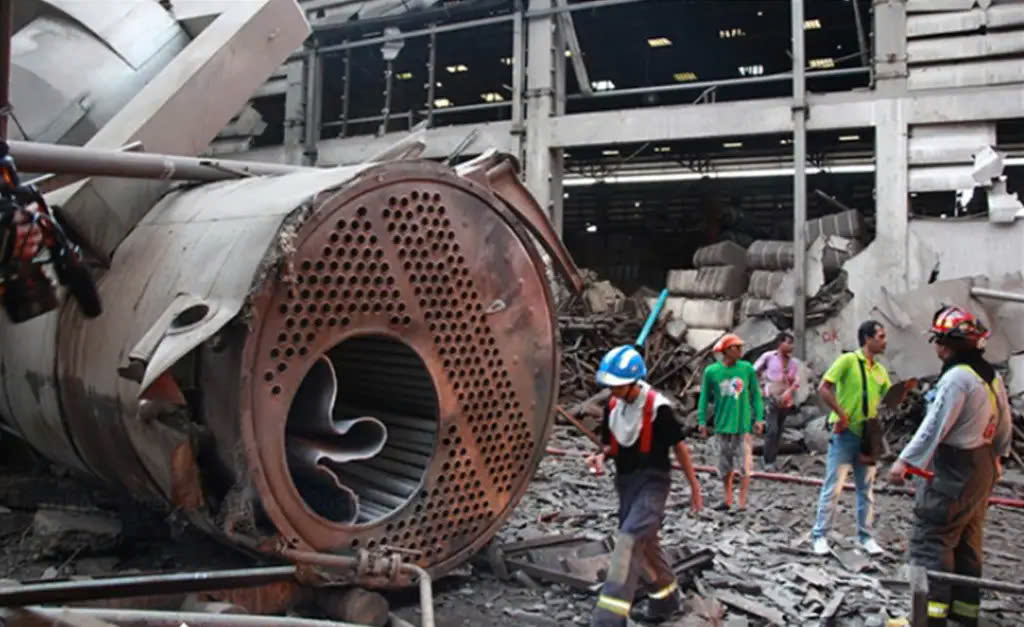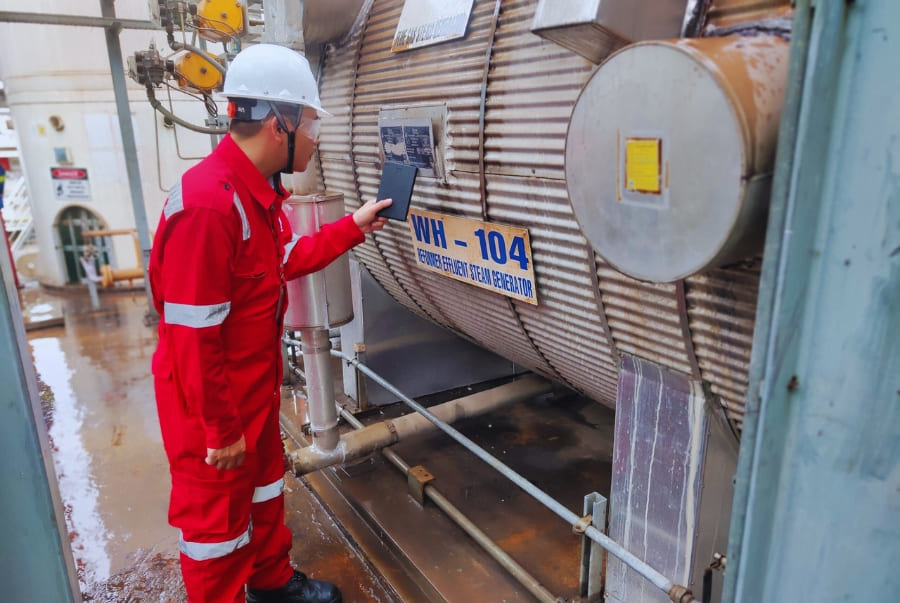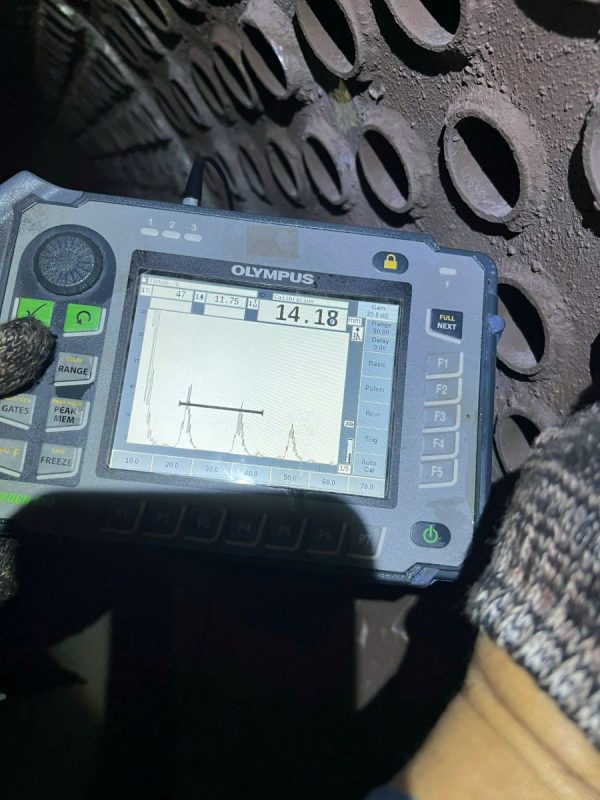A boiler is the “heart” of numerous production processes in industries such as power generation, chemical processing, textiles, and food processing. However, its operation at high pressure and temperature also carries significant risks. From the moment it’s installed, a boiler can face issues due to technical faults or suboptimal operation. Particularly in boilers that have been in service for years, problems such as corrosion, rust, and equipment wear become increasingly common, raising the likelihood of severe incidents. These risks not only lead to material damage but also endanger worker safety and disrupt production timelines.
Therefore, regular inspection and maintenance of boilers are absolutely essential. Beyond mandatory inspections, in-depth surveys and assessments from a skilled technical team are crucial to ensure the boiler is always operating at its best. Prebecc offers this service, aiming to support companies in fully understanding the actual condition of their boilers and providing tailored solutions for safe and efficient operation.
With many years of experience and a professional team of engineers, PREBECC has established a solid reputation for delivering reliable boiler inspection and technical solutions, trusted by many leading brands.
Prebecc goes beyond merely meeting safety standards by offering optimized solutions that enhance performance and extend equipment life. In doing so, Prebecc plays a crucial role in supporting industrial companies to ensure the safety and efficiency of their boiler systems.
1. Potential risks in boiler operation
1.1. For new boilers
Even newly installed boilers can present potential risks due to the following factors:
- Technical faults from the manufacturer: Certain faults may arise during manufacturing, such as structural deficiencies, non-compliant materials, or incorrect assembly, impacting the boiler’s durability and safety.
- Installation errors: The installation process is crucial. Any mistakes during installation can lead to operational issues, such as thermal imbalance or uneven pressure, which can result in damage or severe risks.
- Improper operation: Boilers must be operated following precise procedures to ensure safety and efficiency. If the boiler is not operated as per guidelines, it may become overloaded or fail to perform as designed, leading to unexpected incidents.
1.2. For used boilers
After prolonged use, boilers face various issues related to natural wear and tear. Some specific risks include:
- Wear and natural corrosion: Operating in high-temperature and high-pressure environments causes metal corrosion and component wear, reducing equipment durability and increasing the risk of malfunction.
- Scaling and deposit buildup: During water heating, impurities can accumulate, forming scale on heat transfer surfaces. Scaling not only reduces heat exchange efficiency but also forces the boiler to operate at higher-than-normal temperatures, increasing the risk of failures.
- Steam and exhaust leaks: Long-term wear and thermal expansion can lead to steam and exhaust leaks, affecting operational efficiency and safety.
- Temperature instability: Wear in temperature control components can make it difficult for the boiler to maintain a stable temperature, impacting product quality and increasing energy consumption.
- Explosion and fire hazards: When a boiler operates under unstable conditions, the risks of explosion and fire are heightened, particularly if pressure or temperature exceeds safe limits.

1.3. Impact of potential risks
The risks associated with boilers are not only technical concerns but also serious threats to human safety and company assets. When an explosion or leak occurs, it’s not just about financial losses; it’s about the health and safety of each individual working alongside these massive machines daily. A moment of carelessness or a minor system fault can lead to immeasurable consequences, resulting in the loss of infrastructure and, more tragically, human life—leaving a lasting impact and irreplaceable losses.
An inefficiently operating boiler also has a significant ripple effect—namely, a decline in production efficiency. When the equipment cannot perform at optimal capacity, every hour of production becomes a burden, slowing down schedules and severely impacting the productivity of the entire plant. Expectations for delivery timelines and market demand fulfillment gradually become unattainable, eroding trust with partners and customers.
Moreover, improper maintenance can trap companies in a cycle of rising costs. From component replacements to recurrent repairs, maintenance costs accumulate, creating significant financial pressure. These seemingly minor but continuous expenses can weigh heavily on the company’s profitability.
Beyond financial and operational concerns, substandard boiler performance can have long-term environmental impacts. Poorly controlled emissions and waste can release directly into the atmosphere, causing pollution and affecting surrounding communities. This is not only an environmental responsibility for the company but also a social responsibility to future generations.
2. The role of boiler inspection and assessment
The primary objective of boiler inspection and assessment is to evaluate the overall technical condition of the system, allowing early detection of damages and potential issues. Timely identification enables recommendations for repairs and upgrades to ensure safe and stable boiler operation. Importantly, with a well-maintained boiler system, companies can operate with peace of mind, avoiding unwanted production disruptions.
This inspection and assessment process helps extend the equipment’s lifespan by detecting and addressing minor issues promptly, preventing more significant, severe damage. Furthermore, maintaining the boiler in optimal condition enhances operational efficiency, reduces energy consumption, and saves on operating costs. Most importantly, regular inspection helps businesses comply with stringent safety regulations, protecting both people and the environment while maintaining a strong reputation in the heavy industry sector.

3. Boiler inspection and sssessment process
Prebecc’s boiler inspection process is meticulously designed and implemented in detailed steps to ensure the most accurate and comprehensive assessment results. Each step is executed with precision to detect and evaluate any potential risks within the company’s boiler system:
Visual inspection
The first step in the inspection process is a thorough examination of the boiler’s surface and external components. Experts conduct a direct observation of the entire boiler shell, welded areas, and joints to detect signs of wear, corrosion, or leaks. This crucial step identifies material degradation that may affect the boiler’s durability and efficiency. Any cracks, rust, or blistering are recorded and assessed for severity.
Technical Parameter Verification
After the visual inspection, the inspection team checks essential technical parameters, including operating pressure, working temperature, and thermal capacity. These parameters are accurately measured using specialized equipment to ensure they are within the established safety range. If any irregularities or deviations from technical standards are found, the team issues an immediate alert for prompt resolution.
Water and Exhaust Sample Analysis
Water and exhaust sample analysis is an in-depth step that evaluates combustion efficiency and the boiler’s heat transfer capability. The team collects water and exhaust samples from the system and conducts tests to check indicators such as water hardness, deposit levels, and exhaust gas composition. This analysis helps detect early issues like scaling within the system or emissions exceeding permissible levels—factors that affect the boiler’s lifespan and efficiency.
Use of Specialized Measuring Equipment
To ensure high accuracy, Prebecc utilizes specialized measuring equipment during the inspection process, including thickness gauges, ultrasonic devices, and pressure and temperature sensors. This equipment enables experts to collect detailed, verified data, creating a clear picture of the system’s current condition. In particular, ultrasonic devices help detect hidden material defects, preventing potential future risks.

Comprehensive Assessment and Reporting
Finally, Prebecc provides a detailed report of the entire inspection process, assessing each factor examined and delivering an assessment of the boiler’s technical condition. This report includes specific recommendations for necessary repairs, maintenance, or upgrades, helping the company gain a comprehensive view and make informed decisions.
Through this thorough inspection process, Prebecc is committed to offering clients peace of mind regarding the quality and safety of their boiler systems, enabling companies to operate efficiently while ensuring compliance with stringent safety and environmental standards.
4. Prebecc’s Boiler Inspection and Assessment Services
Prebecc offers a wide range of boiler inspection and assessment services to meet various business needs at different stages—from initial inspection to upgrade consultation. Our services are conducted by a team of experienced and dedicated experts, all with the goal of providing clients with peace of mind and optimizing operational efficiency.
- Initial Inspection: This service provides an overview of the boiler’s condition from the start of its operation, ensuring that the equipment is installed and functioning according to industry standards.
- Periodic Inspection: In compliance with safety regulations, boilers require periodic inspections to detect and promptly address any potential damage.
- Performance Assessment: Prebecc conducts boiler performance checks to optimize operational costs and enhance energy efficiency for businesses.
- Solution Consultation: Our expert team is always ready to provide recommendations for repairs, maintenance, and upgrades based on the inspection results, ensuring that the boiler remains in top condition.
With extensive experience in industrial boilers, Prebecc’s specialists are equipped to handle even the most complex situations. Armed with advanced tools and measuring equipment, they can deliver in-depth analyses and precise evaluations. Our workflow is designed to be professional and efficient without compromising thoroughness, saving clients time and ensuring high effectiveness.

Prebecc is committed to providing detailed and specific reports on the boiler’s technical condition, supported by clear data and comprehensive assessments. In addition, our team is dedicated to advising clients so they fully understand any issues and the most suitable solutions. After service completion, Prebecc remains available to provide ongoing support and answer questions, ensuring clients can operate their equipment safely and efficiently.
At Prebecc, every service represents our commitment to quality and reliability, helping businesses optimize performance, reduce risks, and promote sustainable growth.
